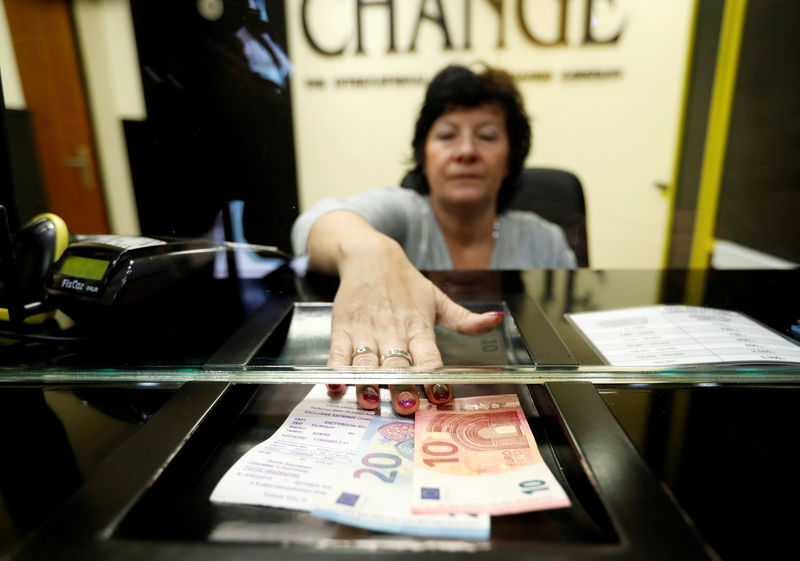By Gergely Szakacs
BUDAPEST (Reuters) - After years of policy measures to stimulate lending and cut borrowing costs, Hungary's central bank is nearing a watershed moment as inflation nudges toward its highest in a decade.
The cheap money it has pumped into the economy, combined with government tax cuts and wage hikes, has finally started feeding into prices, lifting the central bank's favored gauge of lasting inflation trends close to 3 percent last month.
That means the National Bank of Hungary could be nearing what it has said would be a "gradual and cautious" process of reversing the aggressive monetary easing campaign it began in August 2012.
The central bank expects its key measure of sustained price trends, tax-adjusted core inflation, to exceed its 3 percent target for most of the next two years.
Some analysts say that could leave it with few options but to start normalizing policy, although data over the next few months will be determine the extent and timing of any actions.
"Core inflation will be key," said analyst Peter Virovacz at ING in Budapest. "This will climb constantly, reaching 3 percent by January or February.
"Businesses have been putting off price hikes while the economy gained strength," he said. "But now they think that consumers can take it because of the double-digit wage rises, so they are lifting not just volumes, but prices as well."
Core inflation rose to 2.9 in December, central bank data showed on Tuesday. Services prices rose by 2.3 percent year-on-year, the fastest pace since August 2014, the statistics office said.
"There are a few groups within services where price rises are quite pronounced, mostly in labor-intensive services, such as maintenance or cosmetics," statistician Borbala Minary said.
"An acceleration is clear, with the most likely culprit being the increase in labor costs."
Inflation trends will paint a mixed picture in the coming months, analysts say, as a likely decline in headline inflation figures due to lower oil prices is accompanied by a rise in core inflation due to strong demand and a weaker forint.
(GRAPHIC: Hungarian core inflation excluding indirect taxes - https://tmsnrt.rs/2Hf4K3F)
"It is mostly driven by wage dynamics, very strong household consumption demand, and last year's forint weakening is also feeding through to some extent," said economist Eszter Gargyan at Citigroup (NYSE:C).
"If this trend continues, it could trigger some sort of reaction from the central bank, even if headline inflation dips below 3 percent."
Unions at Daimler's Mercedes-Benz factory in Hungary have secured wage rises of 22 percent for this year and another 13 percent for 2020 for most workers. That is part of a wider trend in wage hikes triggered by a chronic shortage of workers in an economy that grew 4.6 percent last year.
BUTTER AND WAGES
Peter Andrusch, who runs a pastry shop near the central bank's headquarters in Budapest, says he faced some big cost rises last year, such as the price of butter, but none larger than wage bills.
"If somebody leaves and I need to hire a new employee, they cost at least 20-25 percent more than the one who left," he said, adding that he aims to put off lifting his prices until the autumn.
Andrusch says he generally raises prices by 5-6 percent at a time, even if costs would justify bigger hikes.
(GRAPHIC: Hungarian core inflation and wage rises - https://tmsnrt.rs/2SOWjxn)
Istvan Kovacs, an advisor at the Alliance of Hungarian Hotels and Restaurants, said the weakening of the forint, which fell about 3 percent versus the euro last year, has already filtered into hotel room prices.
"Presuming that there is peace and quiet in the world, we can estimate a 7 to 8 percent increase in prices this year on a national average," he said.
"The wage rises are beginning to show up. People see that others are traveling and they follow suit."
Some analysts say the central bank could signal how it plans to normalize monetary policy as soon as its March meeting, after Governor Gyorgy Matolcsy is reappointed or a successor found.
"The combination of strong growth, rising core inflation and a shrinking (current account) surplus sits at odds with the notion that Hungary's real rates are the lowest in the whole (emerging market) universe," economists at Morgan Stanley (NYSE:MS) said in a note.
"We believe that already in March the bank will indicate more clearly that policy is being normalized via liquidity absorption and/or modest increases in the bottom end of the rate corridor."
